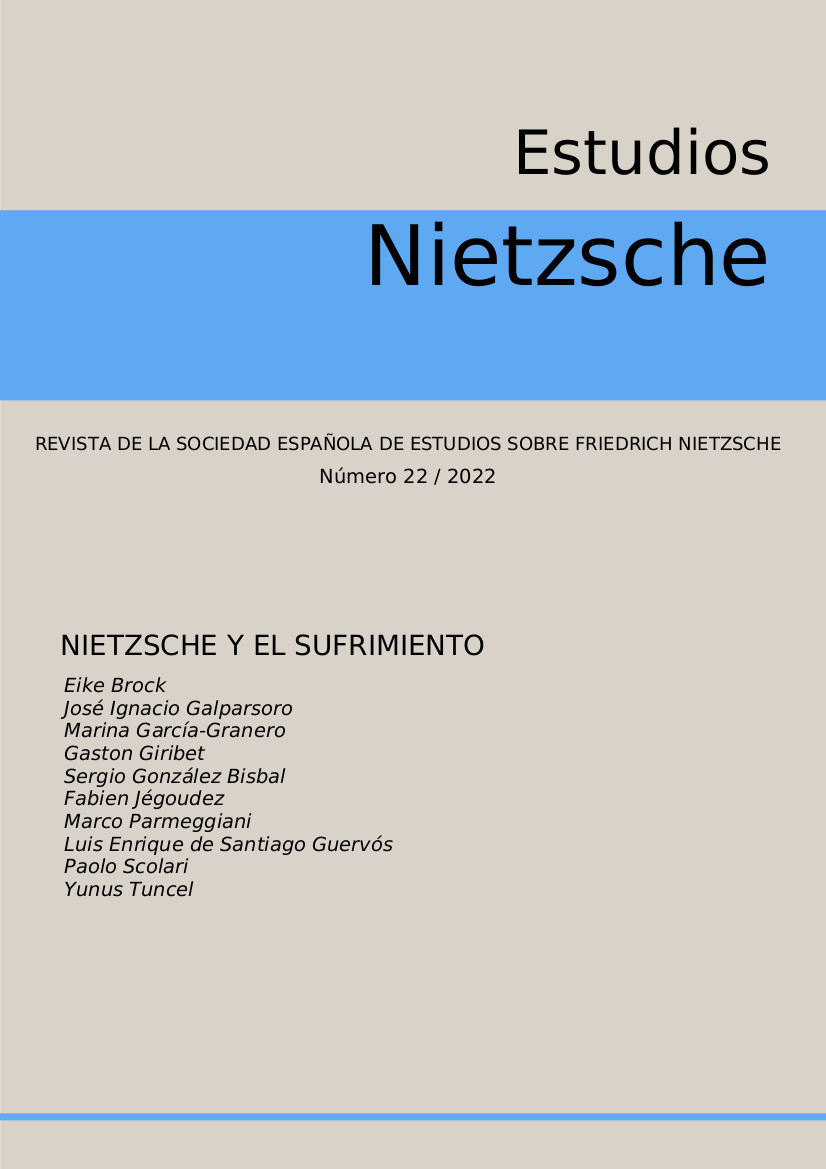The Question of Human Suffering in Nietzsche
DOI:
https://doi.org/10.24310/EstudiosNIETen.vi22.14648Palabras clave:
suffering, pain, tragic suffering, pity, compassion, transfigurationResumen
Suffering and how one relates to one's own and others' sufferings are important themes in Nietzsche's works from the first to the last, as I examined in my recent monograph, Human Emotions in Nietzsche (Basel: Schwabe, 2021). In this article, I will build on what I wrote on this subject in this book and elsewhere, as I examine five paradigms for dealing with suffering, which I name: aesthetic, critical/historic, emotional, power, and transfiguration. Although these paradigms and the ideas that support them are present in Nietzsche's works and many Nietzsche readers may be aware of them, their organization in this form has appeared to me during the pandemic. I do not claim that these paradigms form a complete picture, but I believe they are sufficient to give us a broad picture of Nietzsche's teachings on suffering.
Descargas
Métricas
Citas
Freud, Sigmund, Civilization and its discontents, trans. by J. Strachey, New York, W. W. Norton, 1961.
Hollingdale, Nietzsche: the man and his philosophy, Cambridge: Cambridge University Press, 1965.
Kafka, Franz, The Trial, trans. by David Wyllie, Mineola, New York, Dover, 2009.
Nietzsche, Friedrich, Beyond Good and Evil, trans. by W. Kaufmann, New York, Vintage Books, 1966.
---Trans. by R.J. Hollingdale, Daybreak, Cambridge: Cambridge University Press, 1982.
---Trans. by W. Kaufmann and R. J. Hollingdale, On the genealogy of morals, trans. by W. Kaufmann, Ecce homo, New York, Random House/Vintage Books, 1989.
---"Homer's Contest" in The portable Nietzsche. Ed. and trans. by by Walter Kaufmann. New York: Penguin, 1982.
--- Trans. by R. J. Hollingdale, Human, all too human, Cambridge: Cambridge University Press, 1986.
--- Trans. by W. Kaufmann, The birth of tragedy, New York, Vintage Books, 1967.
--- Trans. by W. Kaufmann, The gay science, New York, Vintage Books, 1974.
--- Trans. by G. Parkes, Thus spoke Zarathustra., Oxford, Oxford University Press, 2005.
--- Twilight of the Idols, in The Portable Nietzsche, New York: Viking Penguin, 1982.
---Untimely meditations II: the use and disadvantage of history for life, trans. by R. J. Hollingdale, Cambridge, Cambridge University Press, 1997.
Tuncel, Yunus, Nietzsche on human emotions, Basel, Schwabe, 2021.
---Agon in Nietzsche, Milwaukee, Marquette University Press, 2013.
Descargas
Publicado
Cómo citar
Número
Sección
Licencia
A partir del número 21 (2021) esta revista se publica únicamente en acceso abierto (ruta diamante).
Desde ese número 21, como los números anteriores publicados en ESTUDIOS NIETZSCHE, están sujetos a la licencia Creative Commons Reconocimento-NoComercia-Compartirigual 4.0 cuyo texto completo puede consultar en <http://creativecommons.org/licenses/by-nc-sa/4.0>
Es responsabilidad de los autores/as obtener los permisos necesarios de las imágenes que están sujetas a derechos de autor.
Esta obra está bajo licencia internacional Creative Commons Reconocimiento-NoComercial-CompartirIgual 4.0.
Los derechos de autoría son de dos tipos: morales y patrimoniales, los cuales Estudios de Nietzsche reconoce y respeta. Los derechos morales son los relacionados con el reconocimiento de autoría. Son prerrogativas perpetuas, irrenunciables, intransferibles, inalienables, inembargables e imprescriptibles como consecuencia del vínculo indivisible del autor/a y su obra.
Los derechos patrimoniales son aquellos que se derivan de la reproducción, distribución, adaptación o comunicación pública de la obra, entre otros. Estos derechos patrimoniales son cedidos por Estudiso de Nietzsche a la Universidad de Málaga en acceso abierto.
Los autores/as cuyas contribuciones sean aceptadas para su publicación en esta revista conservarán el derecho no exclusivo de utilizar sus
contribuciones con fines académicos, de investigación y educativos,
incluyendo el auto-archivo o depósito en repositorios de acceso abierto de cualquier tipo.
La edición electrónica de esta revista esta editada por la Editorial de la
Universidad de Málaga (UmaEditorial), siendo necesario citar la procedencia en cualquier reproducción parcial o total.







11.png)
